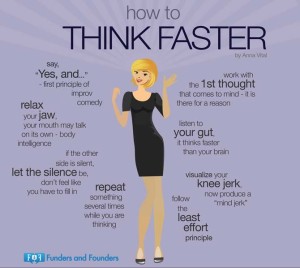This doesn’t help if your main writing work today is a novel. But if you’re writing lots of smaller pieces, if you’re blogging, if you’re pitching stories out to people, if you are doing anything that is bitty, take a minute to do a meal plan.
For instance, this news site The Blank Screen will almost invariably have five new articles per day. If a lot happens, if something very big and relevant to you and I goes on, then it’s more. It’s rarely less because there is always enough going on and enough to read that I can help you postpone actually doing any work.
I don’t try to write five articles per day, though, I try to write six. It’s not always possible of course but when it is, when I can do it and when there is material to write about, then a sixth piece is a real help.
It can’t be something time-sensitive, it can’t be breaking news, but it can still be something useful and interesting – just something useful and interesting that I can hold to the next day. That means the next day begins with me already having one of the five started. If I then manage to write six new ones, I can hold two over for another day.
You could argue that this is like preparing today’s meal and then using leftovers tomorrow. I like that except it feels mildly insulting to whatever tomorrow’s articles are. Still, it’s true.
But there’s something else. It’s easier to write that sixth article than it is to write the first. It’s like you’re in the zone by then, you’ve got five pieces behind you, a sixth is not a massive stretch.
On Fridays, I also write The Blank Screen email newsletter (do sign up for your copy). Also on Fridays I write an entirely personal blog called Self Distract. Then on the first Monday of every month I write an email newsletter for the Writers’ Guild of Great Britain’s West Midlands branch. Now, that Guild newsletter goes out on that first Monday in the month but I’ll write as much of it as I can the previous Friday. So that means on one Friday in a month I am writing two email newsletters, one personal blog and five or six news articles. Doing them all in one go, piece after piece in a row, is much easier and faster than picking up one piece a day and working on those.
As well as being in the zone both of writing and of researching new material for the newsletters, there is the practical element that they get written in the same places. I’ll compile the ideas in Evernote but both newsletters are sent using a service called Mailchimp and there are certain steps you go through. Go through those steps for The Blank Screen newsletter first means you whack through them all a second time for the Writers’ Guild much faster.
Everything you write – I mean you, specifically you – has three parts to it. There’s the getting ready to write, there’s the writing, there’s the finishing up. If you can do more writing in the middle then you save the time getting ready and you save the time wrapping up the details.
I see that very much like planning out the meals for the week and knowing that if I do a slow cooker thing on Tuesday that it will last me Wednesday and Thursday too.
One thing. The Blank Screen newsletter always includes a section called What I’m Writing. Ostensibly this is to show you that I am doing some bleedin’ work, I’m not just after telling you to do some. It does also definitely mean I will write something in the week so that I don’t have to confess laziness to you.
But.
It also very specifically means I will always include a reference and a live link to the new personal Self Distract blog.
Which means I have to write and publish Self Distract first.
By making this choice, I set a sequence for myself and that means I never have to think about it. I’m sitting down now to write Self Distract and that is the only thing I can do, it is the right thing to do, I can concentrate on it fully.
Maybe I just need tricks like this to get me through the week but I bet you do too.
